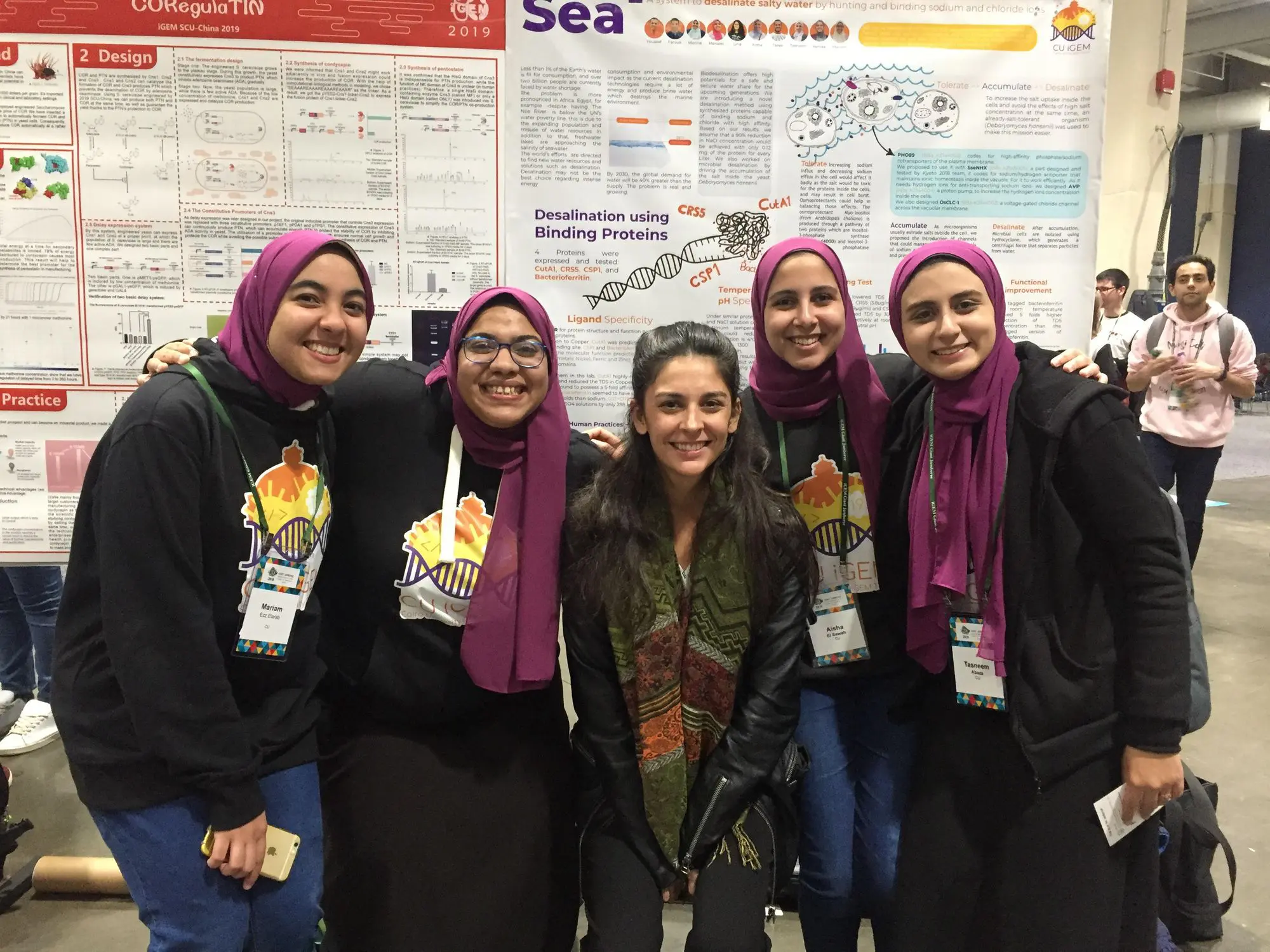
One of iGEM’s founding tenets is that successful experiments require a global lens. That’s why iGEM’s student teams are asked to use synthetic biology to better their communities and the world at large. But, as with scientists the world over, their efforts are often shaped by the challenges of the world around them.
Cairo University’s iGEM team exemplifies this. The 10-person team won Opentrons sponsorship because their project aimed to solve an issue affecting their community: water scarcity. However, the same socio-economic obstacles that contribute to water scarcity also greatly limited support for their research. Their experience reminds us that for many scientists, progress is still a privilege and not a right.
We’re sharing their story to voice unequivocal support for scientists who face the same battles as Team Cairo—and to remind our community that the democratization of science is an ongoing process requiring not just tenacity, but collaboration.

Team Cairo. CREDIT: Team Cairo Wiki
Support for scientific programs—especially synthetic biology—in Egypt is minimal due to a lack of funding, resources, and personnel. In order to participate in iGEM 2019, Team Cairo spent nearly two years creating learning synthetic biology from scratch by contacting field professionals and asking for resources and guidance.
While Egypt has sent teams to iGEM before, 2019 marked the first time an Egyptian team worked from one location with solely Egyptian students.
The second major hurdle team Cairo faced was securing funding. According to Nature Middle East, Egypt financially prioritizes high-stakes problems requiring immediate solutions over laboratory research. The result is that the public and government characterize scientists as impractical idealists whose work takes years to prove valuable. Given that they were trying to solve the water shortage problem, Team Cairo initially campaigned for funds outside their institution. But the country’s stigma toward laboratory research forced them to secure institutional support. While they were able to secure funding from their university president, they still needed to pay iGEM’s registration fee. iGEM charges an $850 registration fee for each team member, and the amount for Team Cairo was a sum greater than tuition paid to faculty at their university. It took four months for them to secure payment for the registration fee, during which time the team focused on designing a synthetic biology solution to Egypt’s water scarcity problem.
When Team Cairo discovered that Egypt’s third largest freshwater lake transformed into a salt basin, they decided to focus their project’s efforts on desalination.
They decided to genetically modify the halotolerant yeast Debaryomyces hansenii, a naturally occurring sea flora, to uptake salt from lake water and keep it out of the environment. They hoped this would reduce the salt concentration in water as a pre-treatment step in existing desalination infrastructures.
The team designed a two-pronged approach to their desalination efforts. The first involved removing efflux channels in the yeast responsible for eliminating toxins, preventing it from re-releasing salt back into the water. They would also introduce osmoprotectants to the cell in order to maintain its integrity with high levels of salinity. Their second approach involved locating metal binding proteins with an affinity for sodium and chloride ions to introduce binding domains and latch the protein to the salt, resulting in a quicker desalination effort.
Team Cairo hoped to use the OT-2 pipetting robot to genetically modify the yeast. However, due to customs issues, the team didn’t receive the robot until a few weeks before flying to Boston. The DNA sequences necessary to genetically modify the yeast, the Twist Biosciences resources necessary to manipulate it to tolerate high levels of salinity, and the iGEM kit were delayed in customs as well.
As a result of these delays, Team Cairo made limited progress. They did manage to engineer the yeast to retain salt for one hour before the cells re-released the saline. They also made progress in determining the best proteins and binding agents for desalination.
But limited progress doesn’t discredit the hard work they put into their project.
Team Cairo’s efforts as young scientists to fight battles on all fronts to attend iGEM 2019 mirrors work done by many other scientists all over the world. They were overjoyed to attend the conference, and counted every hardship as a lesson. Their ability to overcome obstacles and learn lessons from them makes them successful, even though they didn’t achieve everything they hoped to in the lab.
At Opentrons, we fully support the democratization of science to support scientists all over the globe. By pricing high-quality pipetting robots at a fraction of traditional costs and offering open-source materials, we enable the advancement of science for all scientists all over the globe by removing financial hardship… but even with that help, scientists like those in Team Cairo still need more help. More suppliers at an affordable price point. More nonprofits offering support and direction. More cooperation between universities and government agencies.
We have a long way to go before democratizing science. But we’re happy to do our part and advocate for young biologists like those in Team Cairo. We hope we can inspire other scientists to do the same.

Team Cairo with Opentrons freelance writer Elisia Guerena. CREDIT: Elisia Guerena
Curious if automation will work for your lab workflows? Contact us for a free consultation.